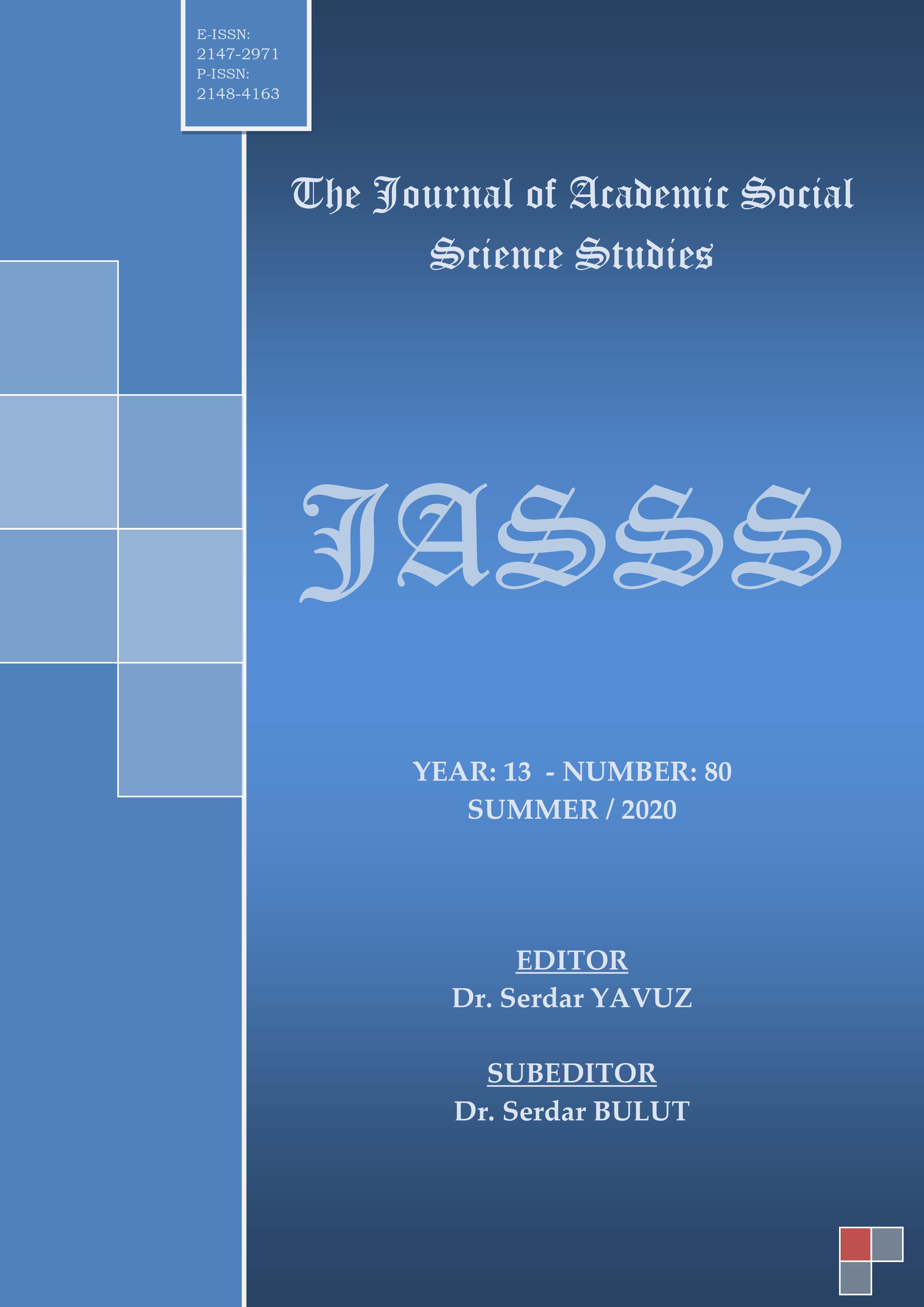Author :
Abstract
Beklenti içerisinde olunmadan karşıdakinin kaygısını kendi tasasının önüne koyan, onun için çözüm arayan ve ona faydalı olmak durumuna “dostluk” denilmektedir. Dosta, Türklerin en fazla ihtiyaç hissettiği zaman dilimlerinden biri “İstiklâl Harbi” süreci olmuş, bu süreçte Türklerin maruz kaldığı sıkıntıları kendi üzüntüleri imiş gibi ölene değin sahiplenmiş olan “gayri Türk” yazarlara sayılı da olsa tesadüf edilmiştir. Bu sayılı yazarlardan biri de Claude Farrére olmuştur. Farrére, “dostluk” un anlamına uygun tutum ve tavır içinde olmak için aynı millete veya dine mensup olmanın bir mecburiyet olmadığını göstermiş, insanî ve yazar kişiliği ile Türkleri ve Türkiye’yi zor ve sıkıntılı günlerinde yalnız bırakmamıştır. Farrére, varlık-yokluk mücadelesinde istiklâlini elde etmeye çaba sarf eden Türk milletinin halini sağlıklı bir şekilde gözlemlemiştir. Farrére, Türklerin haklı olmalarına rağmen mağdur edildiklerini dile getirmiş ve Türkiye’ye muhtelif zamanlarda ziyaretlerde bulunmuştur. Farrére, 18-19 Haziran 1922 tarihli ziyaretine ilişkin; Mustafa Kemal’in karargâhına tamamen özel bir ziyaretçi olarak gittiğini, seyahatin amacının; eşsiz bir vatansever olan büyük insanı selamlamak, tanımak ve ülkesiyle bağımsız Türkiye arasında kendisinden daha yetkili olanların işaretini verdikleri dostluk gösterisinde bulunmak olduğunu ifade etmişti. Farrére, Türkiye’nin belli başlı tutum ve değerlendirmelerini zaman ve değişen süreç içerisinde eleştiriye tâbi tutmuş olsa da onun, Türk milletine yönelik alaka ve sevgisi ölene kadar devam etmiştir. Çalışmanın amacı, Türk dostu olan Farrére’in Türk millî davasındaki önemini ve onun Türkler tarafından nasıl görüldüğünü ortaya koymak olmuş, Farrére’in düşünceleri, fikirleri ve önerileri, içinde bulunulan devre göz önünde bulundurularak ele alınmış, telif ve tetkik eserlerden de istifade edilmiştir.
Keywords
Abstract
It is called “friendship” to put the anxiety of the other person in front of their own anxiety without any expectation, to seek solutions and to be beneficial for them. The “War of Independence” process was one of the timeframe that the Turks felt most in need of friendship. In this process, there were “non-Turkish” writers who embraced the troubles of the Turks as if they were their own troubles. One of these few authors was Claude Farrére. Farrére showed that it was not necessary to belong to the same nation or religion to behave according to the meaning of friendship. As a human and author, Farrére did not leave the Turks and Turkey alone in their difficult and troubled times. Farrére properly observed the state of the Turkish nation trying to achieve independence in their struggle for survival. He expressed that the Turks were victims although they were right and he visited Turkey several times. Regarding his visit in 18-19 June 1922, Farrére said that he went to Mustafa Kemal’s headquarters as a private visitor, and the purpose of his visit was to recognise and salute that great unique patriotic man, as well as to materialise the previously declared signs of friendship between his country and Turkey. Although being occasionally critical of some of Turkey’s attitudes and evaluations, his interest and love for Turkish nation continued until his death. The aim of the study is to reveal the importance of Turkophile Farrére in the Turkish national struggle and how he was seen by the Turks. Farrére’s thoughts, ideas and suggestions were analysed considering his time. The relevant copyrighted works were also used.
Keywords
- (1989). Atatürk' ün Söylev ve Demeçleri, C. I-III. Ankara: Atatürk Araştırma Merkezi Yay.
- Akşam 2 Ağustos 1950.
- Akyüz Y. (1988). Türk Kurtuluş Savaşı ve Fransız Kamuoyu (1919-1922). Ankara: TTK. Yay.
- Baykal H. (1991). Kurtuluş Savaşında Türk-Fransız İlişkileri ve Bir Fransız Türk Dostu Albay Mougin. Ankara Üniversitesi Türk İnkılâp Tarihi Enstitüsü Atatürk Yolu Dergisi. 7/ 1-53.
- Bulut Y.(1993). “Türk Dostları”: Pierre Loti ve Claude Farrére. İstanbul: İstanbul Üniversitesi Sosyal Bilimler Enstitüsü, Yüksek Lisans Tezi,
- Dağistan A. (1999). Türk Kurtuluş Savaşı Yıllarında Türk-Fransız Yakınlaşmasında Claude Farrére’nin Rolü. Atatürk Araştırma Merkezi Dergisi. XV/44, 501-512.
- Evcin E. (2015). Gazi Mustafa Kemal’in Bolu’yu Ziyaretleri, CTAD. 21/ 137-162.
- Farrére C. (2001). Türklerin Manevi Gücü. Ankara: Berikan Yayıncılık.
- Gaulis B. (1999). Kurtuluş Savaşı Sırasında Türk Milliyetçiliği. Yeni Gün Haber Ajansı Basın ve Yayıncılık.
- Giray M. (1962). Büyük Türk Dostu Claude Farrére’nin Atatürk’ü Ziyareti. Yakın Tarihimiz, II,/25.
- Goloğlu, M. (1971). Cumhuriyete Doğru 1921-1922. Ankara: Başnur Matbaası Yayınları.
- Gronau D. (1994). Mustafa Kemal Atatürk ve Cumhuriyetin Doğuşu. İstanbul: Altın Kitaplar Yayınevi.
- Güven C. (2012). Milli Mücadele’de Mustafa Kemal Paşa’nın Yabacılarla Temas ve Görüşmeleri. Eğitim Yayınevi.
- Konukçu E. (2002). Atatürk ve Bolu, Atatürk Araştırma Merkezi Dergisi, XVIII/54/ 1035-1045. Kuleyin Ş. N. (2017). Seyyahların Gözüyle Ankara. Ankara: Altan Özyurt Matbaacılık Yayınları.
- Kunduracı Osman-Aytaç Ahmet (Ed.).(2017). Uluslar arası Türk Sanatı, Tarihi ve Folkloru Kongresi/ Sanat Etkinlikleri. Anka Basım Yayın.
- Önder M. (1975). Atatürk’ün Yurt Gezileri. Ankara: Türkiye İş Bankası Kültür Yayınları.
- Özçelebi A. (1974). Mustafa Kemal Atatürk ve Claude Farrére. Erzurum: Erzurum Atatürk Üniversitesi 50.Yıl Armağanı Cilt:2, Atatürk Üniversitesi Basımevi. 37-53.
- Özel S. (2004). Atatürk’ün Büyük Taarruz Öncesinde Adapazarı-İzmit Gezisi. Türk Dünyası Araştırmaları Dergisi. 5/ 145-175.
- Özüçetin Y. (2011). Anadolu Gazetelerinden Biri Olan İzmir’e Doğru ve Pierre Loti’nin Gazetedeki Yazıları. Uluslar arası Sosyal Araştırmalar Dergisi. 4/18/ 264-273.
- Sarıhan Z. (1996). Kurtuluş Savaşı Günlüğü IV. Ankara: TTK Yayınları.
- Şimşir, N. B. (1981). Atatürk ile Yazışmalar 1920-1923. Ankara: Kültür Bakanlığı Yayınları.
- Yalman A. E. ( 1997). Yakın Tarihte Gördüklerim ve Geçirdiklerim I-II (1888-1922). İstanbul: Pera Turizm ve Ticaret Yayıncılık.





